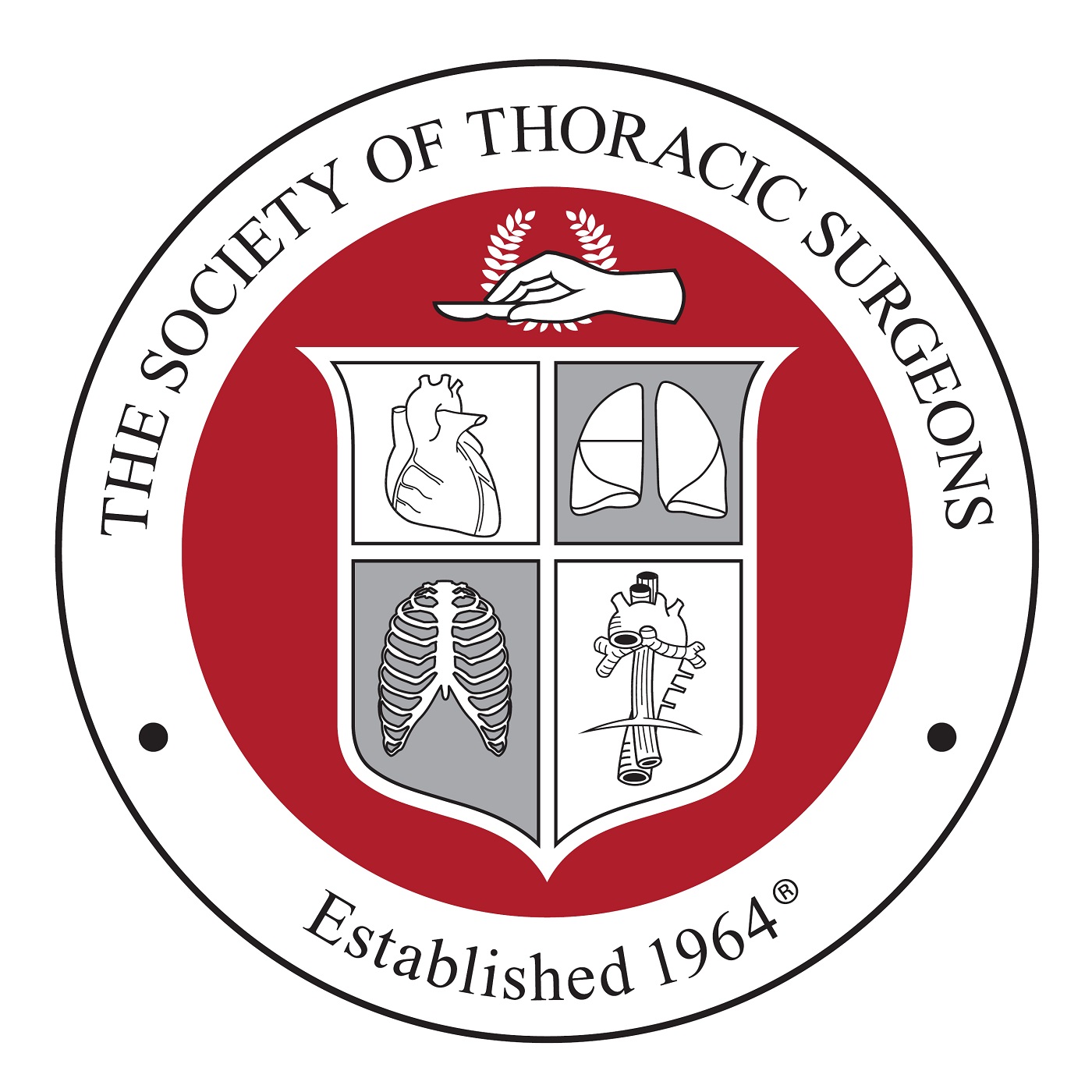Episodes

Friday Jun 05, 2020
STS Summer Series: Early Career Surgeons, COVID-19, and the Future
Friday Jun 05, 2020
Friday Jun 05, 2020
STS President Joseph A. Dearani, MD, and Mara B. Antonoff, MD, moderate an interactive panel discussion with early career cardiothoracic surgeons about how COVID has affected their scope of work and how it may change going forward. They also discuss the expanding role of telemedicine and silver linings from the COVID pandemic. Panelists include Elizabeth A. David, MD, Melanie A. Edwards, MD, Gabriel Loor, MD, HelenMari L. Merritt-Genore, DO, Olugbenga T. Okusanya, MD, and Elizabeth H. Stephens, MD, PhD.
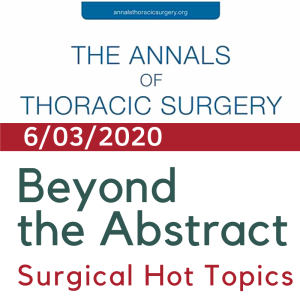
Wednesday Jun 03, 2020
Wednesday Jun 03, 2020
Hosted by Thomas K. Varghese Jr., MD, MS, the “Beyond the Abstract” program explores the “whys” behind articles in The Annals of Thoracic Surgery and discusses next steps with authors and thought leaders. In the latest episode, John S. Ikonomidis, MD, PHD, joins Dr. Varghese to discuss the findings of the 2019 STS Practice Survey. Mandatory cognitive testing, increasing the number of women in the workforce, and job satisfaction are a few of the topics that are addressed. Read the related Annals article online: https://bit.ly/2Y0uiqe
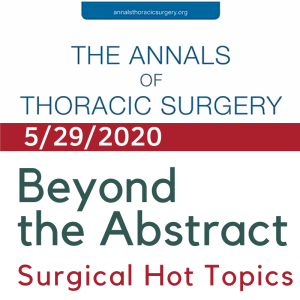
Friday May 29, 2020
Friday May 29, 2020
The death rate from cancer has steadily declined over the past 25 years; however, worldwide there were 9.6 million deaths in 2018, with lung cancer still number one among all cancer types. In the latest episode of “Beyond the Abstract,” a program that explores the “whys” behind an article in The Annals of Thoracic Surgery, Dr. Kemp H. Kernstine joins host Dr. Tom Varghese to discuss whether tumor FDG-PET avidity represents enhanced glycolytic metabolism in non-small cell lung cancer. Read the related Annals article online: https://bit.ly/3c9sXm5.
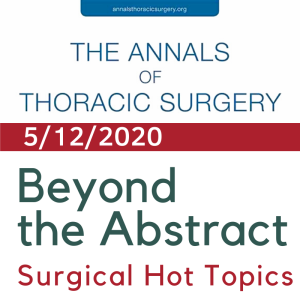
Tuesday May 12, 2020
Beyond the Abstract: Pain and Opioid Use After Thoracic Surgery
Tuesday May 12, 2020
Tuesday May 12, 2020
Hosted by Thomas K. Varghese Jr., MD, MS, the “Beyond the Abstract” program explores the “whys” behind articles in The Annals of Thoracic Surgery and discusses next steps with authors and thought leaders. In the latest episode, Lisa M. Brown, MD, MAS, joins Dr. Varghese to discuss a widespread unresolved healthcare problem—pain. Dr. Brown explains why it is important to learn more about predictors of chronic pain and the impact on health-related quality of life, known as pain interference.
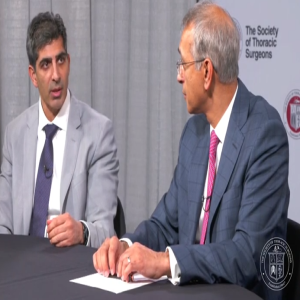
Tuesday Apr 21, 2020
The Future of Mitral Valve Repair
Tuesday Apr 21, 2020
Tuesday Apr 21, 2020
Managing and treating mitral valve disease have both changed radically over the past few years and now include transcatheter as well as surgical approaches. What does the future hold for mitral valve repair and replacement? During the most recent STS Annual Meeting, Vinod Thourani, MD, asked that question of Steven F. Bolling, MD, Gorav Ailawadi, MD, and Wilson Y. Szeto, MD. They also discussed new tools and technologies, making sure that cardiothoracic surgeons are involved on the care team, and training with transcatheter techniques.

Monday Apr 13, 2020
Appropriate Use of Robotics in Cardiothoracic Surgery
Monday Apr 13, 2020
Monday Apr 13, 2020
Robotics is being called the “fourth industrial revolution." For some cardiothoracic surgeons, robotics means smaller, faster, and easier, resulting in patients getting out of the hospital sooner, having less pain, and returning to function faster. For others, the jury is still out on whether or not robotics will add long-term value, especially if surgeons face potential carpal tunnel injuries, back pain, and cervical stenosis. David T. Cooke, MD, moderates a panel discussion with Robert E. Merritt, MD, Lana Y. Schumacher, MD, Melanie A. Edwards, MD, and Inderpal S. Sarkaria, MD. They discuss the learning curve for robotic surgery, the complexity of procedures that can be performed robotically, a team approach to robotic surgery, getting hands-on experience, and future improvements to robotic technology.
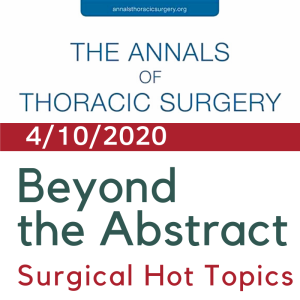
Friday Apr 10, 2020
Friday Apr 10, 2020
Among the proactive steps that the Society is taking to help its members and other health care professionals deal with the evolving COVID-19 pandemic it is developing guidance documents—one for each discipline. In the latest episode of "Beyond the Abstract," Dr. Daniel Boffa joins Dr. Tom Varghese to talk about the guidance provided by representatives from multiple cancer, surgical, and research organizations for triaging patients with thoracic malignancies.
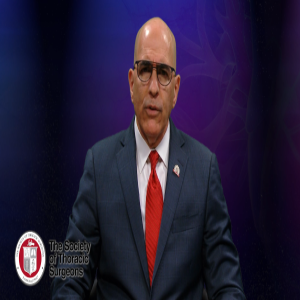
Tuesday Mar 31, 2020
STS Responds to the COVID 19 Crisis
Tuesday Mar 31, 2020
Tuesday Mar 31, 2020
STS President Joseph A. Dearani, MD, updates members on the COVID-19 pandemic and explains how the Society is supporting cardiothoracic surgeons and patients.
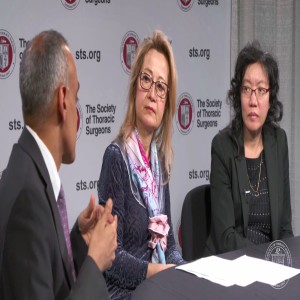
Sunday Mar 29, 2020
Young Professors: Insights and Tips for Early and Mid-Career Faculty
Sunday Mar 29, 2020
Sunday Mar 29, 2020
For cardiothoracic surgeons who are hoping to advance in their careers, it’s often difficult to balance clinical work with the scholarly activities that are necessary for promotion in a modern academic medicine environment. Ourania A. Preventza, MD, and colleagues including Himanshu J. Patel, MD, Elaine E. Tsang, MD, and Sunil Singhal, MD, provide insight on the processes required and tips to help young surgeons successfully get to the next step.

Monday Mar 23, 2020
Artificial Intelligence and Machine Learning in Cardiothoracic Surgery
Monday Mar 23, 2020
Monday Mar 23, 2020
Cardiothoracic surgeons are studying the use of artificial intelligence (AI) and machine learning (ML) to improve risk prediction in the hopes that patient outcomes also will improve. Arman Kilic, MD, and Ara A. Vaporciyan, MD, along with medical student Brian Ayers, discuss what AI and ML mean, how it can uncover previously unknown relationships in medical data, and how it can be used to assist the surgeon in the operating room.

